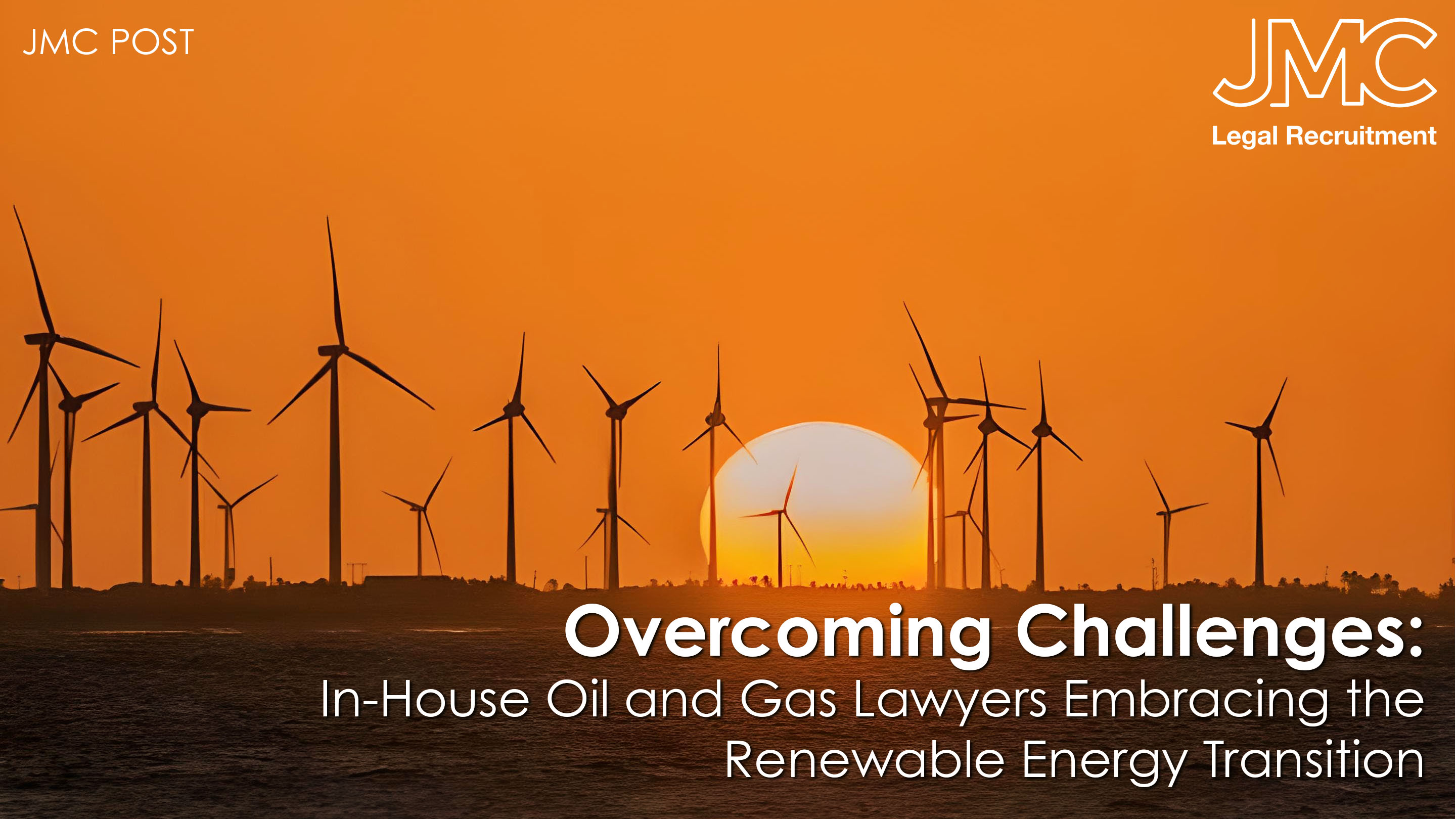
Overcoming Challenges: In-House Oil and Gas Lawyers Embracing the Renewable Energy Transition
27 Oct, 20236 minutes
Overcoming Challenges: In-House Oil and Gas Lawyers Embracing the Renewable Energy Transition
The worldwide shift towards renewable energy sources is reshaping the energy landscape, drawing attention from governments, businesses, and consumers alike. The transition from fossil fuels to renewables is at the forefront of this transformation. As a result, in-house lawyers from the oil and gas sector are increasingly finding themselves venturing into new territory as they make the transition to legal teams in the renewable energy sector. This shift, while promising and necessary, presents a distinct set of challenges that demand adaptability, innovation, and a broadened perspective.
Shifting Regulatory Landscape:
In-house lawyers making the move to renewable energy must grapple with a rapidly evolving regulatory environment. Renewable energy industries are subject to a different set of incentives, tax credits, and environmental regulations compared to the traditional oil and gas sector. Lawyers need to become well-versed in these new regulations, staying current with policy changes to ensure compliance and minimise legal risks.
Technology and Innovation:
The renewable energy sector is characterised by ongoing technological advancements and innovations, including solar panels, wind turbines, and energy storage systems. In-house lawyers need to familiarise themselves with these technologies, along with the intellectual property issues that accompany them. They may also be called upon to negotiate intricate agreements and licenses for technology-related assets.
Financing and Investment Challenges:
Renewable energy financing often takes on different structures compared to oil and gas projects. In-house lawyers must become acquainted with various financing models such as power purchase agreements (PPAs), tax equity financing, and renewable energy credits (RECs). Understanding these financial structures and dealing with the intricacies of project finance can be a challenge for those accustomed to more conventional methods in the oil and gas industry.
Environmental and Sustainability Considerations:
While environmental and sustainability concerns have been relevant to oil and gas companies, they form the very core of the renewable energy sector. In-house lawyers must develop a profound understanding of environmental and sustainability issues, including carbon offset programs, emissions reduction strategies, and sustainable development goals. They must also integrate these aspects into their legal advice and decision-making processes.
Contracts and Agreements:
Transitioning in-house lawyers must become proficient in drafting, negotiating, and interpreting contracts and agreements specific to the renewable energy industry. These may include power purchase agreements, interconnection agreements, land leases for renewable projects, and more. Understanding the unique nuances and complexities of these agreements is essential to ensure the success of renewable energy projects.
Stakeholder Engagement & Cultural Shift:
Renewable energy projects often involve a high level of community engagement and public relations efforts. In-house lawyers must play a pivotal role in navigating public perception, addressing local concerns, and working with diverse stakeholders, including government agencies, local communities, and environmental organisations. The ability to communicate effectively and engage with these stakeholders is pivotal in the renewable sector.
Arguably the most significant challenge is the cultural shift from a traditional fossil fuel industry to a renewable one. In-house lawyers will likely encounter resistance or skepticism from stakeholders and executives who are accustomed to the oil and gas world.
Conclusion
The transition of in-house lawyers from the oil and gas sector to renewable energy is undeniably a challenging but vital response to the global demand for cleaner and more sustainable energy sources. Adapting to the evolving regulatory landscape, technological advancements, financial structures, environmental considerations, and the imperative for effective stakeholder engagement are key hurdles to overcome.
As lawyers navigate these challenges, they can significantly contribute to the growth and success of the renewable energy sector, helping their organisations lead the way towards a more sustainable and environmentally responsible future. The transition may be steep, but with the right skills, determination, and a commitment to sustainability, in-house lawyers can play a pivotal role in propelling the renewable energy industry forward.



